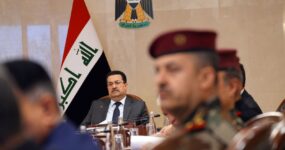The British website “Middle East Eye” reported that the Iraqi armed factions will not target any American interests or military bases in Iraq or Syria until further notice, as these factions and political forces have decided to distance themselves from Israel’s battles with the Lebanese Hezbollah and Iran, fearing that the expansion of the growing regional wars will destroy Iraq and the sites of these forces and factions.
The British report, translated by Shafaq News Agency, quoted Iraqi officials and leaders of armed factions supported by Iran as saying that their focus would instead be on providing humanitarian aid and financial support to civilians affected by the Israeli war on Lebanon.
Nasrallah’s assassination
After the report pointed to the recent escalation in the war, including the assassination of the Secretary-General of the Lebanese Hezbollah, Hassan Nasrallah, and the launching of ballistic missiles by Iran that damaged military bases in Israel, it said that this raised estimates of the possibility of greater Iraqi participation, whether through the regular Iraqi army or various paramilitary groups, but Iraqi officials say that there is a belief that this could cause the collapse of the political, economic and military system in Iraq and the fall of its government.
The report pointed out that Prime Minister Mohammed Shia al-Sudani held dozens of meetings in recent days with political leaders, leaders of armed factions allied with Iran, and senior security officers.
The report quoted one of Al-Sudani’s advisors as saying that the prime minister sought, during these meetings, to “explain the reality of the situation facing Iraq and the consequences of any Iraqi party getting involved in the ongoing conflict.”
He confirmed that Al-Sudani also met with many Arab and Western diplomats, and spoke with many leaders of neighboring countries, including the Egyptian president, the Emir of Qatar, and the King of Jordan.
According to Al-Sudani’s advisor, he asked them to help “stop the ongoing Zionist aggression on Lebanon and Gaza, which threatens to expand the conflict in the region.”
The report quoted Iraqi officials and faction leaders as saying that they believe that Iraq will be one of four countries that Israel will attack soon, in response to the Iranian missile attack.
After the report said that the dramatic and brutal Israeli attacks on Lebanon and Hezbollah during the past two weeks had delighted the Israeli leadership and the Israelis, it quoted Al-Sudani’s advisor as saying that “the Iranian missiles dispelled their euphoria.”
According to the same advisor, this “means that Israel will certainly respond to this attack, and will inevitably attack Iraq, as well as Syria and Yemen, in addition to some oil sites in Iran,” adding that “Al-Sudani is trying hard to deprive the Israelis of any pretext that can be used to strike Iraq.”
Al-Sudani’s advisor considered that “the political, security and economic situation in Iraq is fragile and will not tolerate adventure from any party, and that any ill-considered action in the coming days will have a high price and could burn everything.”
Possible targets
According to expectations from sources in the armed factions and security services, Israel may attack several targets, including the headquarters of the Popular Mobilization Forces.
The report pointed out that rumors spread last week about Israel preparing a list of 35 targets in Iraq, including the locations and names of political leaders and leaders of armed factions. However, leaders of armed factions and security officials confirmed that there is no indication of the existence of such a list.
The report quoted a senior official in the Popular Mobilization Forces as saying, “Its targets in Iraq are known and clear, as it will attack the camps of some armed factions, in addition to the camps and headquarters of the Popular Mobilization Forces, and it may target some leaders of the armed factions.”
After pointing out that “the only two figures actually targeted are Akram al-Kaabi, the leader of the Hezbollah al-Nujaba Movement, and Abu Hussein al-Muhammadawi, the leader of the Hezbollah Brigades,” the Hashd leader said that the leaders of the other armed factions linked to Iran have replaced their military roles with more political and economic roles, and no longer have any real influence on the armed resistance against Israel.
According to the Popular Mobilization Forces source, “the Israelis and Americans know this and are well aware of it, and they have no interest in targeting them.”
“Islamic Resistance”
The report noted that immediately after the Iranian missile attack ended, the “Islamic Resistance” in Iraq issued a statement confirming that it would not target American interests and military bases in Iraq unless Washington helped Israel attack Iran, or if Iraqi airspace was used to launch Israeli airstrikes, adding that “then all American bases and interests in Iraq and the region will be our target.”
The report quoted a leader of the Hezbollah al-Nujaba movement as saying, “All parties have agreed to stop any military operations at this stage, but if Israel strikes any of them, everyone will respond immediately,” adding that “American and Israeli interests in Iraq and the entire region will be targeted.”
Precautionary measures
The report stated that Al-Sudani had put all Iraqi military forces on high alert since Tuesday evening, while most of the leaders of the armed factions have not appeared in public since then.
The report quoted leaders in the PMF as saying that the leadership of the PMF held a meeting last Monday to discuss the latest developments and ways to secure its offices and forces. According to one of those who attended the meeting, it was agreed to avoid getting involved in the escalating regional conflict, including attacking American forces in Iraq, which they had done repeatedly before the start of this war. They also decided to limit the number of combat elements at their headquarters and to inform the leaders to avoid being there as well.
In addition, the report stated that the leadership of the Popular Mobilization Forces agreed to issue strict instructions to all leaders that all fighters registered with the organization must not be involved in the regional conflict in any way.
The report quoted a source in the meeting as saying, “If they decide to fight, they should not use their fighters registered on the Popular Mobilization Forces’ payroll, or its vehicles or equipment.”
The report indicated that one of the senior commanders, who was present at the meeting, described the situation as “very sensitive, and any mistake, we will all pay the price for,” adding, “We are being targeted, and the locations of our forces, their headquarters, and their weapons depots are exposed and known, so there is no room for any uncalculated action. We are regular forces, so our choice is the government’s choice. It is that simple.”
shafaq.com


